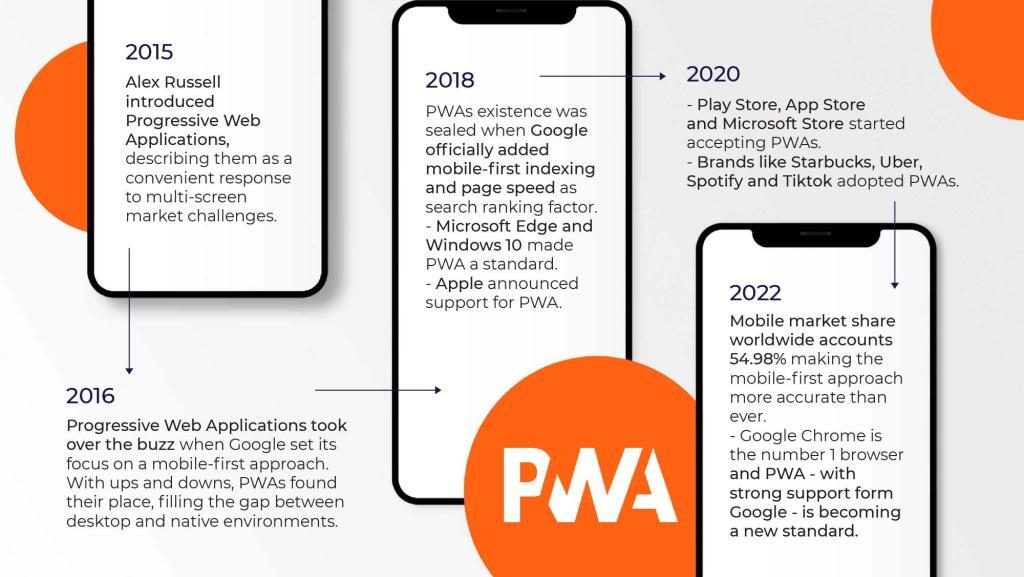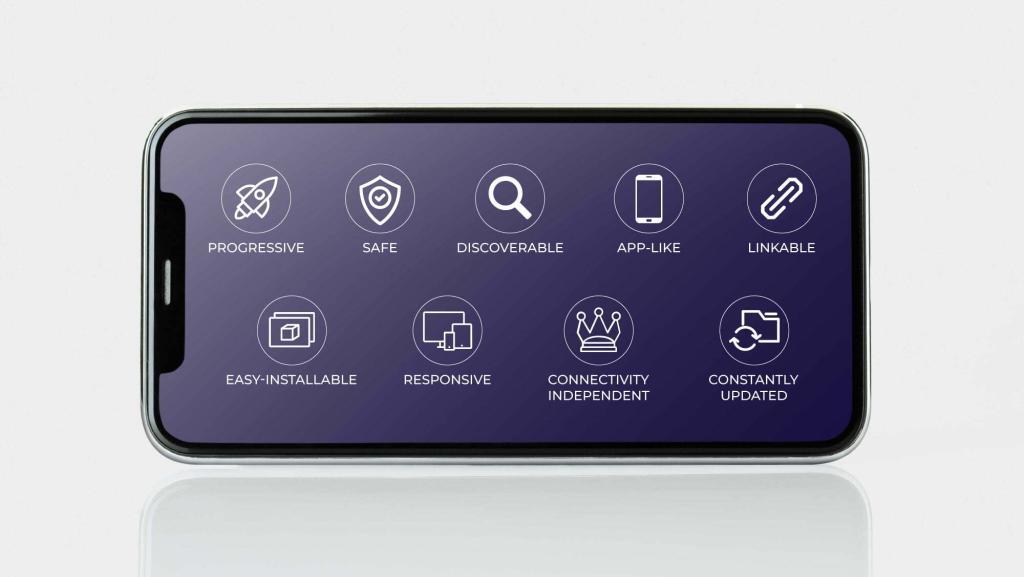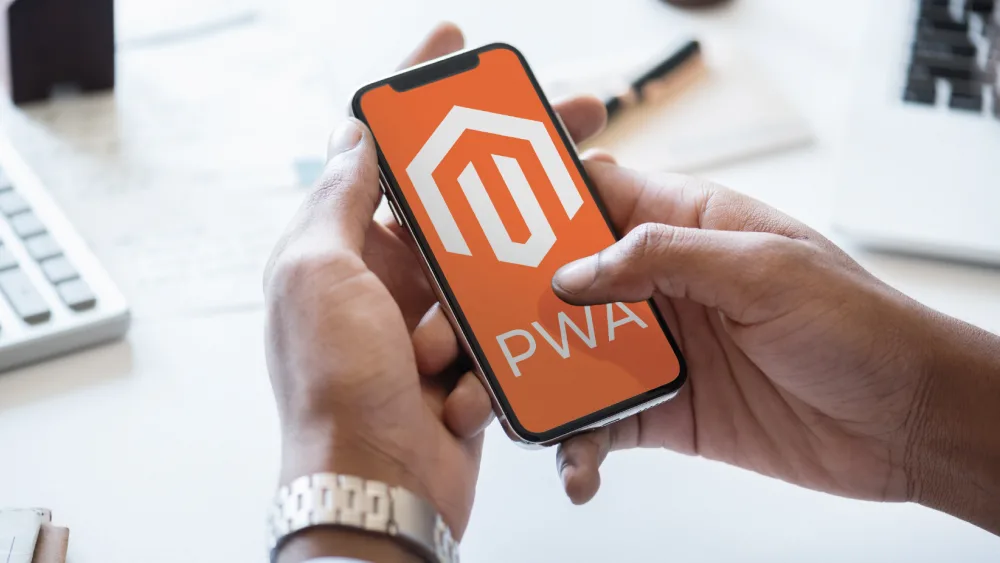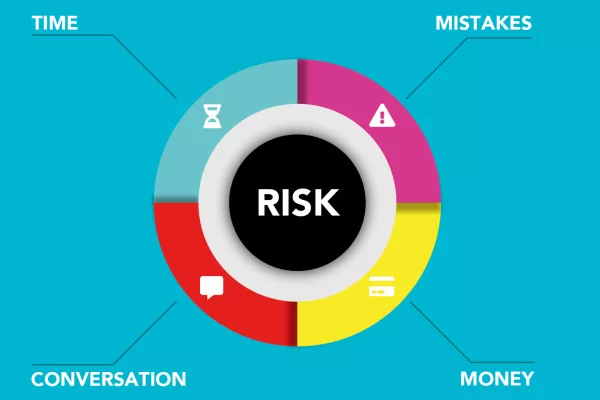PWA (progressive web app) is a special type of web application that combines the features of native mobile apps (built and optimized for a particular platform such as iOS or Android) and web apps (accessible only through the web browser but on any device – desktop, laptops, tablets, and smartphones).
Progressive web apps are accessed through a web browser and they do not require installation or downloading an app from an app store. They are designed to provide the best user experience, and thanks to caching all important data and assets, they can be used without a stable internet connection.
It is estimated that the PWA USA market value will reach 10,5 billion dollars by 2027, and according to Google, desktop PWA installations have increased by 270% since the beginning of 2021.
If your eCommerce business wants to capture a share of the fast-growing PWA market, you can always schedule a free call with our Magento Solution Architects and find out what our PWAs can do for your business growth.
A Brief History of PWA
The concept of PWA was first introduced in 2015. by Google and quickly after they declared switching to a mobile-first approach, progressive web apps gained importance. Just 5 years later, all major online app stores and renowned brands such as Starbucks and Tiktok started recognizing the value of these kinds of apps.

In recent years, with the widespread adoption of this new technology, PWAs have significantly raised the bar when it comes to user experience and expectations.
And there’s no mystery as to why users love PWAs – they are not only extremely fast and convenient, but they can work offline, send push notifications, and use all the features of their mobile devices.
And since these apps look and behave just like regular web pages (which means they use web browsers), they also deliver a powerful mix of functionalities that will help you achieve your business goals, such as more conversions and higher overall revenue.
PWA: A Powerful Tool for Growth
Progressive web apps can be very beneficial for your business, no matter the industry you are in. Whether you have a service-oriented business, an eCommerce store, or a news platform, PWAs are a way to go. They will ensure seamless user experience across all devices and operating systems you can think of, without having to create multiple app versions.
In addition to their versatility, they are also responsive and accessible and will guarantee immersive features that foster loyalty and increase conversions. Even when you go offline (or just have low internet connectivity), browsing is still possible, which further strengthens customers’ devotion to your brand. So this is perfect for businesses that operate in areas where internet connection is limited or unreliable.
From a technical standpoint, PWAs are a great choice as well. They will eliminate the need to develop separate apps for the web, iOS, and Android, saving your time and most importantly, money.
Progressive web apps do not need to be updated too often, do not struggle with performance issues, and, since they are built with HTML, CSS, and JavaScript, they can easily be integrated into the exciting website infrastructure.
You can always turn to different cross-platform solutions, but they do not always guarantee the best user experience or mobile-friendly and responsive interfaces. If your priority is creating a safe, responsive, and reliable application that will facilitate business growth, progressive web apps should be your first choice.

PWA Benefits for eCommerce Businesses
PWAs can be particularly good for eCommerce businesses and can save business owners a lot of trouble in the long run. Due to their well-rounded features and the fact they have the best features of both worlds (native and web apps), they deserve thorough consideration.
Let’s quickly go through the main advantages of going with PWA:
- PWA doesn’t require a presence in the app stores
This translates to a shorter time-to-market. And sometimes that is all you need for success. To be the first to serve the needs of your target audience and beat all competition while they are still developing their native apps.
- It’s cost-effective
As you don’t need to pay for separate Android and iOS apps and teams to build them, you can invest your money elsewhere. Your CAC (Customer Acquisition Cost) will decrease as well since the users don’t need to visit an app store and download an app to be able to use it. So it is more likely that more people will give it a go and try your app.
- PWA leverages the power of headless commerce
PWA is often the first step of creating Headless technology (this refers to the front-end or head of your business being independent). Thanks to this approach, your storefront will be separated from the backend of your eCommerce platform. This means complete freedom for your marketing team. With headless architecture (such as headless CMS), they will become less reliant on developers and able to easily make changes on their own.
- Better SEO results and decreased bounce rate
PWAs speed up the process of the application being indexed on Google. They have URLs like standard web pages, which means that Google can crawl and index them with ease. Moreover, search engines like smooth, fast apps with limited retention, and promote them by giving them better rankings in search results. And, as we all know, the higher the position, the greater the chance of grabbing the user’s attention and growing your customer base.
Not to mention that the PWA’s performance decreases the bounce rate – a metric that shows how many users have left your site after viewing only one page. This also impacts how Google evaluates a site and determines its position in SERP (Search Engine Results Page).
- Push notifications
Push notifications are a crucial feature for eCommerce websites that strive to re-engage their visitors and increase customer lifetime value. With PWA, you can easily inform your customers about a great new offer, introduce new collections, or simply send abandoned cart notifications, which will instantly pop up on their home screens.
I believe this pretty much sums it all up, but if you have more questions about PWA or Headless-related matters, feel free to ping me on LN, I’m always up for a good chat.







Comments are closed.